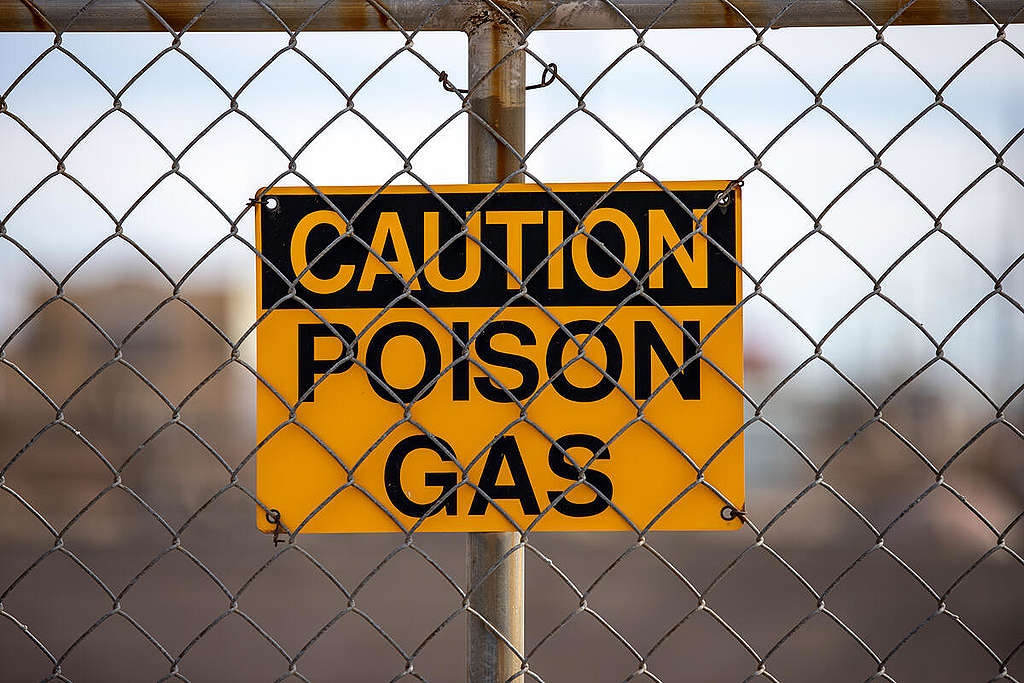Paris – A new investigation reveals that France and Europe do not need to add gas supply capacity and import LNG gas from the U.S. to address a short-term energy crisis. The report, by Greenpeace France and investigative media outlet Disclose, calls for the cancellation of state support to TotalEnergies for the installation of the Le Havre floating LNG terminal due to be commissioned in September 2023 for a period of five years.
The installation of the Le Havre LNG terminal (FSRU Cape Ann) is supported by the French government, and has no legal requirement for an environmental impact assessment or consultation with citizens. The report shows how these measures contravene earlier French and European climate and environmental commitments. Also that the argument put forward by the French government to justify this state support for the project - the need to secure energy supply to France and its neighbours during an energy crisis - doesn't hold up.[1] TotalEnergies' planned LNG terminal in Le Havre exposes France's inconsistent energy choices, made to follow gas industry lobbyists rather than climate science, says Greenpeace.

© Aaron Sprecher / Greenpeace
Anusha Narayanan, Greenpeace U.S. global project lead to stop fossil fuel expansion, said: "The boom in transatlantic gas trade is burning the last remaining bridges to preserve a livable future by keeping the world below the 1.5°C (2.7°F) heating threshold. Greenpeace France's investigation demonstrates how both European customers and low-income communities in the southern U.S. could needlessly pay a hefty price merely to enrich major polluters like TotalEnergies."
Edina Ifticene, Greenpeace France campaigner, said: "Encouraging shale gas production in the U.S. for importing into Europe is a hypocritical, if not cynical, attitude, since France banned the hydraulic fracturing technique on its own territory back in 2011. By encouraging and profiting from such production overseas, France is accepting its indifference to the consequences of its energy policy for the climate and for the public health of the local people residing near extraction sites."
According to the investigation by Greenpeace France and Disclose:
- In 2022, France's gas import capacity was at least 64,77 bcm (including 17,41 bcm that France exported in 2022), with 43,57 bcm used in 2022. French gas consumption went down in 2022, and this is just the beginning of the necessary ongoing reduction, expected in light of climate threats and policy scenarios.
- Data show that France has enough gas import capacity to address consumption needs, with French stocks securing sufficient cover for the winter 2023-2024. France currently has a good margin to address its energy needs and is not facing any supply crisis that would justify the installation of a floating supply terminal in Le Havre to allow additional imports. France's EU neighbours are also facing an overdevelopment of gasification capacity, and they do not need the additional floating facility to receive 5 bcm of additional LNG supply.
- TotalEnergies will benefit greatly from this new facility, as it will use 50% of the regasification capacity to import its own LNG from the US and maybe even from Russia (knowing that LNG made Total billions in profits in 2022).
- The French government has given TotalEnergies many advantages with this deal, allowing the company to move forward with the project without presenting any Environmental Impact Assessment. French authorities also decided not to publish or make public the "study of risks and dangers" (NB: "Etude des dangers" is the official name of the document in French) because it included some concerning elements.
- While the floating terminal in Le Havre has been promoted by the French government as a temporary measure to address immediate needs, the research highlights how GRTGaz has already been looking at options to extend its operations beyond 5 years. According to GRTGas' 10 years plan 2022-2031, the company envisages the development of:
- A LNG terminal in Antifer, to replace in time the Le Havre terminal;
- A second FSRU in Antifer to complement the Le Havre FSRU;
- A LNG terminal to complement the FSRU in Le Havre. [2]
Greenpeace is calling for the French government to be held to account for choosing to install this LNG infrastructure, and must demonstrate, with clearly sourced and publicly available data, that it genuinely was the best option available. If it cannot do this, the directive of March 13, 2023 relating to the commissioning of the FSRU Cape Ann in Le Havre, and its continued operation for the next five years, should be cancelled, according to Greenpeace France.
A complete list of demands at national level is included in the recommendations section of Greenpeace France report. In addition, Greenpeace developed demands at the European and international level. A full list of these recommendations is available in the Greenpeace International report "Who Profits From War: How Gas Corporations Capitalise on War in Ukraine" (p.18).






